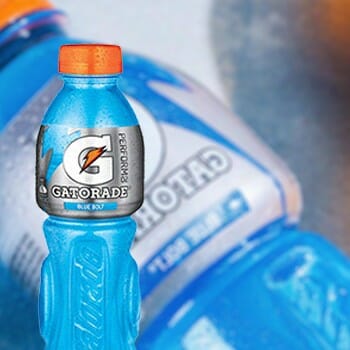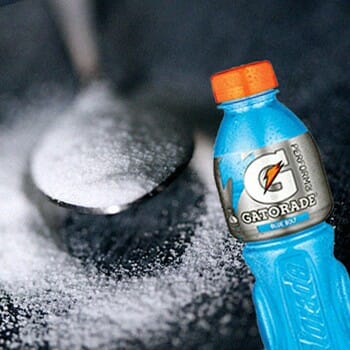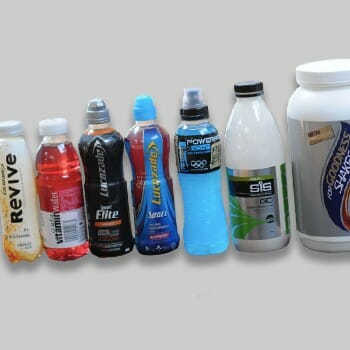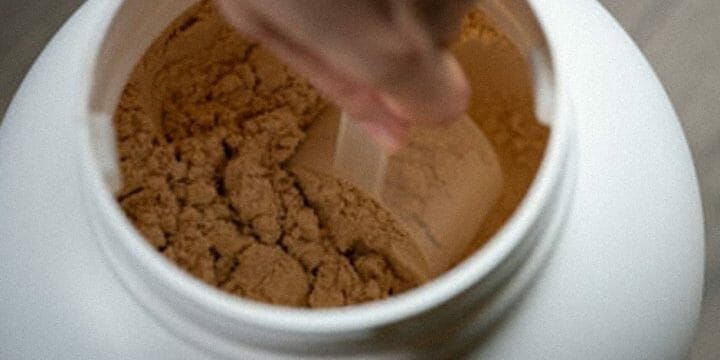Although it's not specifically marketed to vegans, Gatorade is pretty transparent about the ingredients used in their sports drinks.
The tricky part is that a couple of the ingredients may be unacceptable to some vegans.
So, a little bit of chemistry is in order when trying to answer the question ‘is Gatorade vegan?’’.
As a certified personal trainer, I have done a ton of research to find out if vegans can enjoy an electrolyte-packed bottle of Gatorade. Read on to find out the answer to this tricky question.
Quick Summary
- Gatorade is generally considered vegan as it does not contain ingredients that are directly derived from animals, like dairy derivatives or meat.
- The common ingredients in Gatorade include water, sodium chloride, natural flavor, dextrose, sodium citrate, and sucrose.
- A study from PubMed shows that during high-intensity cycling (80% VO2max, <1 h), fluid consumption reduces performance, while at moderate intensity (60–70% VO2max, 1-2 h), it can improve performance by at least 2%, and for exercise over 2 hours, by at least 3%.
- In my opinion, Gatorade can be a suitable option for vegans, especially when choosing varieties with organic sugar and avoiding flavors with questionable natural flavors or colors.
Can Vegans Drink Gatorade?

Yes, vegans can drink the Gatorade as it doesn't contain direct animal-derived ingredients like meat or dairy derivatives. Still, they should be aware of its sugar content, natural and synthetic flavors, and artificial colors, which may sometimes involve animal ingredients or testing.
In my experience, all three varieties of Gatorade, Original, Frost, and Fierce, come with a wide array of flavors.
According to one of the studies from the National Center for Biotechnology Information website, functional beverages represent a palatable and efficient way to hydrate and reintegrate electrolytes, carbohydrates, and other nutrients employed and/or lost during physical training and/or competitions [1].
Gatorade Ingredients

Gatorade was launched back in 1965 when a football coach at the University of Florida requested a team of doctors to devise a solution for dehydration-related issues commonly found in athletes.
But, what exactly is inside a bottle of this sports drink?
The list of ingredients is specific to each flavor, but common ingredients used in all Gatorade flavors include:
water, sucrose (table sugar), dextrose, citric acid, natural flavor, sodium chloride (table salt), sodium citrate, monopotassium phosphate, and flavoring/colorings; blue 1, yellow 5, yellow 6, red 40, blue 1, depending on the flavor.
Some Gatorade flavors are also kosher-certified:
- Original Thirst Quencher - contains sucrose, natural flavor and flavoring/coloring ingredients - kosher-certified
- G2 - Low Sugar Thirst Quencher - contains sugar, natural and artificial flavor, red 40 and blue 1 - kosher-certified
- Zero Thirst Quencher - contains natural flavor, and yellow 6 - kosher-certified
- Flow Thirst Quencher - contains sugar, natural flavor, artificial colors yellow 5 and blue 1
- Fierce Thirst Quencher - contains sugar, natural and artificial flavor, blue 1 and red 40
- Fierce Fruit punch + Berry - contains sugar, natural flavour, and red 40
- Frost Thirst Quencher - contains sugar, natural flavor and blue 1
- Organic Thirst Quencher - contains organic cane sugar and organic natural flavor (both of which are vegan) citric acid, sea salt, sodium citrate and potassium chloride
For a vegan, Gatorade Zero and Gatorade made with organic sugar seems like a safe option, but let’s take a closer look at the kinds of sweeteners used in Gatorade.
3 Problematic Ingredients

1. Sugar
The production process of table sugar sometimes involves animal bone char.
Although the final product itself doesn’t contain any animal-derived ingredients, animal bone char is used in the filtration processes as a whitening agent that makes refined sugar snow-white.
Yes, that’s the awful truth - charred and powdered cattle bones are often, but not always, involved in the production of this everyday product.
So, is sugar in Gatorade vegan? Well, it depends on the type of flavor you choose. Some of the varieties are sugar-free while others only contain organic cane sugar.
It’s often hard to tell where exactly companies get their sugar from, but the safest bet is to stick to organic sugar.
Only the refined variety of cane sugar is typically non-vegan. The other varieties of cane sugar (organic, unrefined, natural or raw) are vegan friendly [1]
If we assume that some Gatorade varieties contain vegan-friendly sweeteners, many vegans would still have a problem with the use of natural flavors.
2. Natural Flavors

There is hardly anything more satisfying than gulping down a bottle of cold, energy-packed Gatorade after a workout.
But have you ever wondered where all those refreshing flavors come from?
Contrary to what many people think, so-called ‘’natural flavors’’ in sports drinks may come from different sources, not only from plants.
Some of the most common sources include:
- Fruit or fruit juice
- Vegetables or vegetable juice
- Spices
- Edible yeast, herbs, bark, buds, root leaves or plant material
- Meat, poultry or seafood
- Dairy products, including fermented products
- Eggs
And just like with the use of bone char in sugar production, it’s almost impossible to know the exact origin of a natural flavor, unless it’s clearly specified on the product label - which is the case with Gatorade sports drink.
This is why some vegans chose to skip on natural flavors altogether, while for others, this is just a minor issue.
3. Artificial Colors

This is another potential deal-breaker for vegans. Some colors are directly derived from animals (like carmine), but most are not. Still, the majority gets tested on animals.
Gatorade sports drink varieties include the following artificial colors:
- R40- unlike some other red food dyes, R40 is not derived from insects, making it vegan
- Yellow 5 and Yellow 6 - these are synthetically made food colors that are not based on animal products
- Blue 1 - this synthetically-made blue dye is commonly found in candies, soft drinks and ice cream, and it’s not animal-derived
- Caramel color - this is usually derived from corn, making it vegan-friendly
Although we could say that Gatorade is vegan, just by looking at the origins of dyes used, let’s not forget that most of these ingredients need to be tested on animals before they reach the consumers.
However, despite the presence of ingredients like sugar, natural flavors, and artificial dyes, many vegans will still consider Gatorade vegan sports drink.
On the other hand, some other Gatorade products like protein powders, protein bars and shakes, directly involve animal products, such as whey, which is clearly indicated on the label.
Are Sports Drinks Healthy?

Sports drinks can be healthy. Sports drinks, including vegan and non-vegan varieties, can be healthy when consumed appropriately to enhance workout performance and recovery, but their high sugar content, as seen in some products like Gatorade, necessitates careful selection, such as opting for low-sugar versions for health benefits.
I regularly consume sports drinks to elevate my workout performance and recover faster.
According to another study from the PubMed website, during high-intensity cycling exercise (about 80% VO2max, <1 h), fluid consumption is associated with reductions in performance; at moderate intensity (60–70% VO2max, ranging from 1 to 2 h), cyclists should expect a gain in performance of at least 2% if fluid is integrated; for cycling exercise longer than 2 h, conducted at moderate intensity, fluid improves performance by at least 3% [2].
Related Articles:
FAQs
What Is the Environmental Impact of Producing Gatorade?
The environmental impact of producing Gatorade includes significant water usage, contribution to plastic bottle waste, and a notable carbon footprint from manufacturing and distribution, important considerations for environmentally conscious consumers.
How Does Gatorade Compare to Other Vegan Sports Drinks Nutritionally?
Nutritionally, Gatorade differs from other vegan sports drinks in its balance of electrolytes, carbohydrates, and sugars, making it essential for consumers, especially vegans, to compare these drinks for their specific dietary needs and performance goals.
Is Gatorade Effective for Hydration and Sports Performance in Vegans?
Gatorade is effective for hydration and enhancing sports performance in vegans, as it replenishes electrolytes lost during physical activities. Still, vegans should consider the drink's ingredients for alignment with their dietary principles.
Are There Ethical Concerns in Gatorade's Supply Chain?
Ethical concerns in Gatorade's supply chain may involve ingredient sourcing, labor practices, and environmental impact controversies, requiring consumers interested in ethical consumption to research these aspects for informed decision-making.
What Are Some Innovative Vegan Alternatives to Gatorade?
Some innovative vegan alternatives to Gatorade in the market offer features like natural ingredients, lower sugar content, and environmentally friendly packaging, providing vegans with options that align more closely with their dietary and ethical values.
References:
- https://www.ncbi.nlm.nih.gov/pmc/articles/PMC6213308/
- https://pubmed.ncbi.nlm.nih.gov/28497286/
About The Author
You May Also Like






